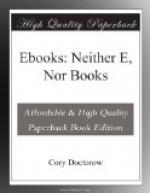Yeah, our attention-spans are different today, but they aren’t necessarily shorter. Warren Ellis’s fans managed to hold the storyline for Transmetropolitan [Transmet cover] in their minds for five years while the story trickled out in monthly funnybook installments. JK Rowlings’s installments on the Harry Potter series get fatter and fatter with each new volume. Entire forests are sacrificed to long-running series fiction like Robert Jordan’s Wheel of Time books, each of which is approximately 20,000 pages long (I may be off by an order of magnitude one way or another here). Sure, presidential debates are conducted in soundbites today and not the days-long oratory extravaganzas of the Lincoln-Douglas debates, but people manage to pay attention to the 24-month-long presidential campaigns from start to finish.
7. We need all the ebooks. [We need all the ebooks] The vast majority of the words ever penned are lost to posterity. No one library collects all the still-extant books ever written and no one person could hope to make a dent in that corpus of written work. None of us will ever read more than the tiniest sliver of human literature. But that doesn’t mean that we can stick with just the most popular texts and get a proper ebook revolution.
For starters, we’re all edge-cases. Sure, we all have the shared desire for the core canon of literature, but each of us want to complete that collection with different texts that are as distinctive and individualistic as fingerprints. If we all look like we’re doing the same thing when we read, or listen to music, or hang out in a chatroom, that’s because we’re not looking closely enough. The shared-ness of our experience is only present at a coarse level of measurement: once you get into really granular observation, there are as many differences in our “shared” experience as there are similarities.
More than that, though, is the way that a large collection of electronic text differs from a small one: it’s the difference between a single book, a shelf full of books and a library of books. Scale makes things different. Take the Web: none of us can hope to read even a fraction of all the pages on the Web, but by analyzing the link structures that bind all those pages together, Google is able to actually tease out machine-generated conclusions about the relative relevance of different pages to different queries. None of us will ever eat the whole corpus, but Google can digest it for us and excrete the steaming nuggets of goodness that make it the search-engine miracle it is today.
8. Ebooks are like paper books. [Ebooks are like paper books]. To round out this talk, I’d like to go over the ways that ebooks are more like paper books than you’d expect. One of the truisms of retail theory is that purchasers need to come into contact with a good several times before they buy — seven contacts is tossed around as the magic number. That means that my readers have to hear the title, see the cover, pick up the book, read a review, and so forth, seven times, on average, before they’re ready to buy.




